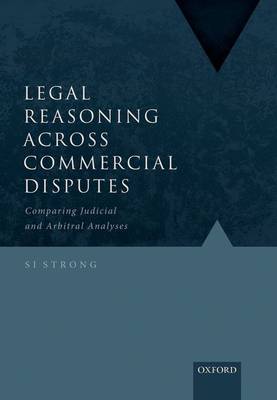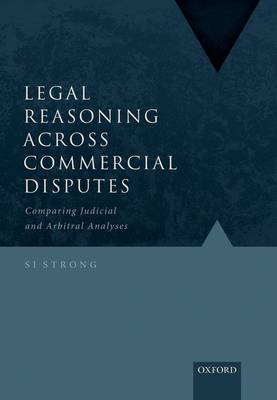
- Afhalen na 1 uur in een winkel met voorraad
- Gratis thuislevering in België vanaf € 30
- Ruim aanbod met 7 miljoen producten
- Afhalen na 1 uur in een winkel met voorraad
- Gratis thuislevering in België vanaf € 30
- Ruim aanbod met 7 miljoen producten
Zoeken
Legal Reasoning Across Commercial Disputes
Comparing Judicial and Arbitral Analyses
Strong
Hardcover | Engels
€ 209,45
+ 418 punten
Omschrijving
This work provides important insights into how judges and arbitrators resolve complex commercial disputes in both national and international settings. The analysis is built from three major research sources which ensures that the analysis can bridge evidence of perception, behaviours, and outcomes amongst judges and arbitrators. A statistical survey provides a benchmark and point of comparison with the subjective statements arising from an extensive programme of interviews and questionnaires to provide an objective lens on the reasoning process that informs decisions and awards in practice. The outcome, presented in Legal Reasoning across Commercial Disputes, is an evidence-based model of the determining factors in legal reasoning by identifying and quantifying approximately seventy-five objective markers for which data can be compared across the arbitral-judicial, domestic-international, and common law-civil law divides. The methodology provides for a thorough and contextual assessment of legal reasoning by judges and arbitrators in commercial disputes. Legal Reasoning across Commercial Disputes investigates the level of sophistication and complexity associated with commercial arbitration relative to commercial litigation through domestic courts. The study not only helps parties make more informed choices about where and how to resolve their legal disputes, it also assists judges and arbitrators in carrying out their duties by improving counsel's understanding about how to best to craft and present legal arguments and submissions. The study also addresses longstanding theoretical concerns about the legitimacy of national and international commercial arbitration by replacing assumptions and anecdotes with objective data. The final part of the book draws together the various strands of analysis and concludes with a number of forward-looking proposals about how a deeper understanding of legal and judicial reasoning can be established to improve the quality of decisions and outcomes for all parties.
Specificaties
Betrokkenen
- Auteur(s):
- Uitgeverij:
Inhoud
- Aantal bladzijden:
- 416
- Taal:
- Engels
Eigenschappen
- Productcode (EAN):
- 9780198842842
- Verschijningsdatum:
- 28/01/2021
- Uitvoering:
- Hardcover
- Formaat:
- Genaaid
- Afmetingen:
- 175 mm x 249 mm
- Gewicht:
- 938 g

Alleen bij Standaard Boekhandel
+ 418 punten op je klantenkaart van Standaard Boekhandel
Beoordelingen
We publiceren alleen reviews die voldoen aan de voorwaarden voor reviews. Bekijk onze voorwaarden voor reviews.











